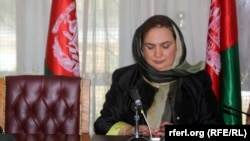Afghan women are consistently excluded from Afghanistan’s peace negotiations and formal talks about the country’s future, international agency Oxfam said in a report published on Monday. Oxfam is campaigning to refocus attention on women ahead of an Afghanistan Conference in London early next month.
Jorrit Kamminga, a policy adviser for Oxfam who has just returned from Kabul, said Oxfam has tracked 23 known sets of peace talks that have been held between the Taliban, the Afghan government, and the international community in the past nine years.
He said that during talks between the international community and the Taliban, not a single Afghan woman was involved. And women were present only twice during talks between the Afghan government and the Taliban.
“Especially for those peace talks organized by the international community we did not see any kind of meaningful participation of women. They may have been consulted at some stage but they really have not been very active and participating from the start,” said Kamminga.
Afghan conference
An Afghan Conference is due to take place in London on December 3 and December 4, and Oxfam says the international community needs to use the platform to defend women’s rights.
Under Taliban rule, women in Afghanistan were banned from schools and work; today nearly 40% of students are girls.
But Oxfam says there is a real risk that these advances will be reversed, unless women are kept at the forefront of the agenda.
“It's really key that the new government and that the international community commits to what they said before -- that women's rights should not be jeopardized and women should really have a seat at the table in any kind of peace negotiations,” said Kamminga.
Dr. Katherine Brown, an expert on the role of women in situations of war based at King’s College London, said, it’s not unusual for women to play a minor role in peace negotiations. During the past decade, she said on average women have represented just 4 percent of all signatories in global peace deals.
“We must not look at this as purely a Taliban issue or an Afghanistan issue. This is about conflict resolution worldwide, where women's voices are consistently devalued and excluded,” she said.
Enabling empowerment
Brown is not optimistic about the upcoming international conference having a real impact on the lives of women in Afghanistan. She said such platforms, however, are not necessarily the best way to improve the lives of Afghan women.
She said the international community makes an assumption that if you have greater women's participation in the public sphere, then empowerment in the private sphere will follow.
“Whereas it could be said that perhaps we need to consider women's everyday lives and how they can be made more secure, and how they can find meaning and value in that,” said Brown.
Women, she said, have a better chance of achieving peace and security working at a local level, than by focusing on the national level.
Oxfam says women currently are suffering the highest levels of violence seen in Afghanistan, that parliamentary quotas for women are dropping, and that laws aimed at protecting their rights are under threat.




